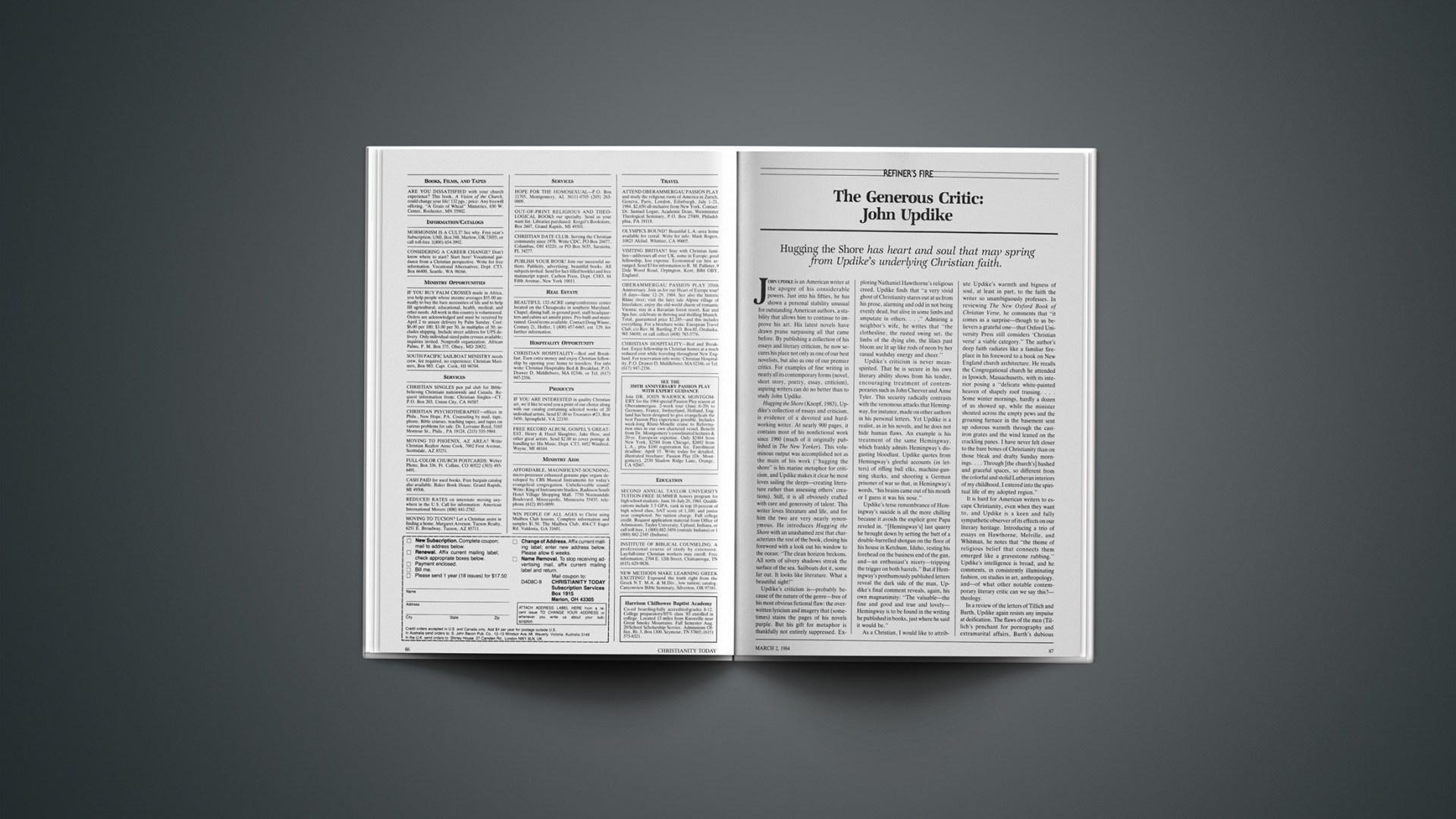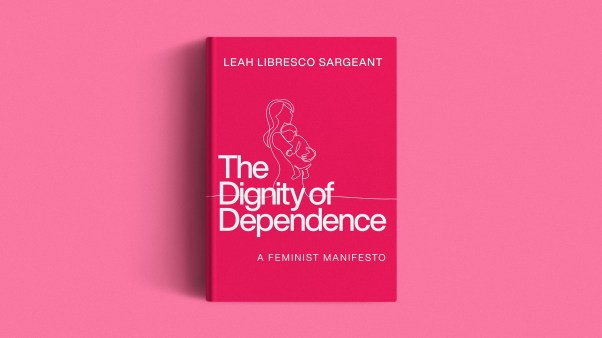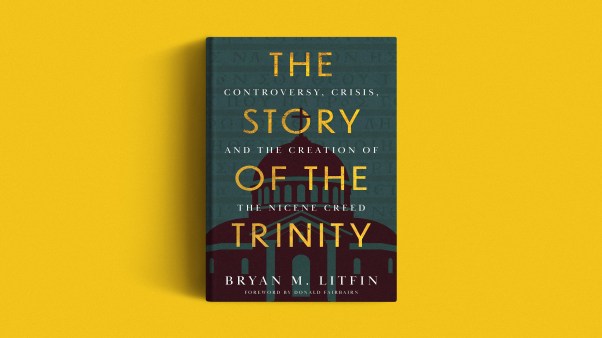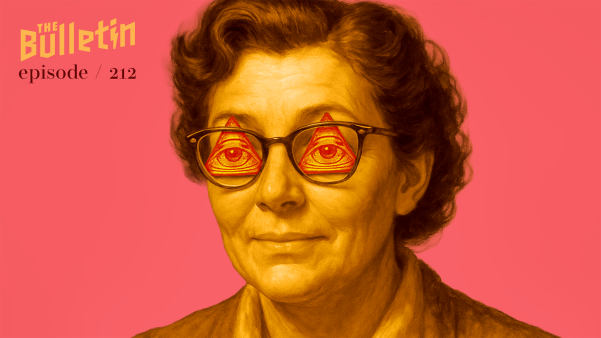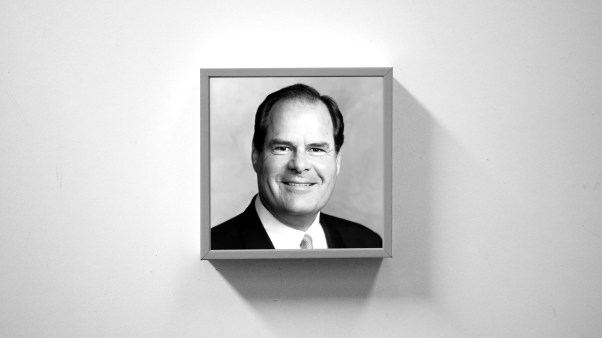Hugging the Shore has heart and soul that may spring from Updike’s underlying Christian faith.
John updike is an American writer at the apogee of his considerable powers. Just into his fifties, he has shown a personal stability unusual for outstanding American authors, a stability that allows him to continue to improve his art. His latest novels have drawn praise surpassing all that came before. By publishing a collection of his essays and literary criticism, he now secures his place not only as one of our best novelists, but also as one of our premier critics. For examples of fine writing in nearly all its contemporary forms (novel, short story, poetry, essay, criticism), aspiring writers can do no better than to study John Updike.
Hugging the Shore (Knopf, 1983), Updike’s collection of essays and criticism, is evidence of a devoted and hard-working writer. At nearly 900 pages, it contains most of his nonfictional work since 1960 (much of it originally published in The New Yorker). This voluminous output was accomplished not as the main of his work (“hugging the shore” is his marine metaphor for criticism, and Updike makes it clear he most loves sailing the deeps—creating literature rather than assessing others’ creations). Still, it is all obviously crafted with care and generosity of talent. This writer loves literature and life, and for him the two are very nearly synonymous. He introduces Hugging the Shore with an unashamed zest that characterizes the rest of the book, closing his foreword with a look out his window to the ocean: “The clean horizon beckons. All sorts of silvery shadows streak the surface of the sea. Sailboats dot it, some far out. It looks like literature. What a beautiful sight!”
Updike’s criticism is—probably because of the nature of the genre—free of his most obvious fictional flaw: the overwritten lyricism and imagery that (sometimes) stains the pages of his novels purple. But his gift for metaphor is thankfully not entirely suppressed. Exploring Nathaniel Hawthorne’s religious creed, Updike finds that “a very vivid ghost of Christianity stares out at us from his prose, alarming and odd in not being evenly dead, but alive in some limbs and amputate in others.…” Admiring a neighbor’s wife, he writes that “the clothesline, the rusted swing set, the limbs of the dying elm, the lilacs past bloom are lit up like rods of neon by her casual washday energy and cheer.”
Updike’s criticism is never mean-spirited. That he is secure in his own literary ability shows from his tender, encouraging treatment of contemporaries such as John Cheever and Anne Tyler. This security radically contrasts with the venomous attacks that Hemingway, for instance, made on other authors in his personal letters. Yet Updike is a realist, as in his novels, and he does not hide human flaws. An example is his treatment of the same Hemingway, which frankly admits Hemingway’s disgusting bloodlust. Updike quotes from Hemingway’s gleeful accounts (in letters) of rifling bull elks, machine-gunning sharks, and shooting a German prisoner of war so that, in Hemingway’s words, “his brains came out of his mouth or I guess it was his nose.”
Updike’s terse remembrance of Hemingway’s suicide is all the more chilling because it avoids the explicit gore Papa reveled in. “[Hemingway’s] last quarry he brought down by setting the butt of a double-barrelled shotgun on the floor of his house in Ketchum, Idaho, resting his forehead on the business end of the gun, and—an enthusiast’s nicety—tripping the trigger on both barrels.” But if Hemingway’s posthumously published letters reveal the dark side of the man, Updike’s final comment reveals, again, his own magnanimity: “The valuable—the fine and good and true and lovely—Hemingway is to be found in the writing he published in books, just where he said it would be.”
As a Christian, I would like to attribute Updike’s warmth and bigness of soul, at least in part, to the faith the writer so unambiguously professes. In reviewing The New Oxford Book of Christian Verse, he comments that “it comes as a surprise—though to us believers a grateful one—that Oxford University Press still considers ‘Christian verse’ a viable category.” The author’s deep faith radiates like a familiar fireplace in his foreword to a book on New England church architecture. He recalls the Congregational church he attended in Ipswich, Massachusetts, with its interior posing a “delicate white-painted heaven of shapely roof trussing.… Some winter mornings, hardly a dozen of us showed up, while the minister shouted across the empty pews and the groaning furnace in the basement sent up odorous warmth through the cast-iron grates and the wind leaned on the crackling panes. I have never felt closer to the bare bones of Christianity than on those bleak and drafty Sunday mornings.… Through [the church’s] hushed and graceful spaces, so different from the colorful and stolid Lutheran interiors of my childhood, I entered into the spiritual life of my adopted region.”
It is hard for American writers to escape Christianity, even when they want to, and Updike is a keen and fully sympathetic observer of its effects on our literary heritage. Introducing a trio of essays on Hawthorne, Melville, and Whitman, he notes that “the theme of religious belief that connects them emerged like a gravestone rubbing.” Updike’s intelligence is broad, and he comments, in consistently illuminating fashion, on studies in art, anthropology, and—of what other notable contemporary literary critic can we say this?—theology.
In a review of the letters of Tillich and Barth, Updike again resists any impulse at deification. The flaws of the men (Tillich’s penchant for pornography and extramarital affairs, Barth’s dubious relationship with Charlotte von Kirschbaum) are unflinchingly examined. But the review ends with the Updike trademark, the final sentence gently but unequivocally asserting the greatness of his review’s subjects: “What lingers of Barth, still ringing in the air of churches and seminaries, was his tone of fearlessness, his bold, encyclopedic, and hearty exposition of the word of God as over against the word of Man; whereas Tillich, unable to exclude anxiety and doubt, brought them into the sanctum, and called them holy emotions.”
Hugging the Shore also sketches Updike’s philosophy of fiction writing—and how the Christian faith affects it. He believes “theology can be vexed but not conclusively discussed in fiction; cosmic conclusions depend upon evidence no novel—no mere emblem of the world—can contain.” And he offers a hint of one way his fiction may serve his faith: “Our actions, our decisions, our vows do matter; what can fiction tell us more important than that?”
There is no question but that Updike’s storytelling often vexes our theology and, with its profuse and explicit sex, challenges our conception of proper Christian art. Just the same, we can be grateful that among famous contemporary authors—with all their fixations on bizarre violence and sex—is one man who unembarrassedly goes to church each Sunday, and sincerely recites the Creed.

